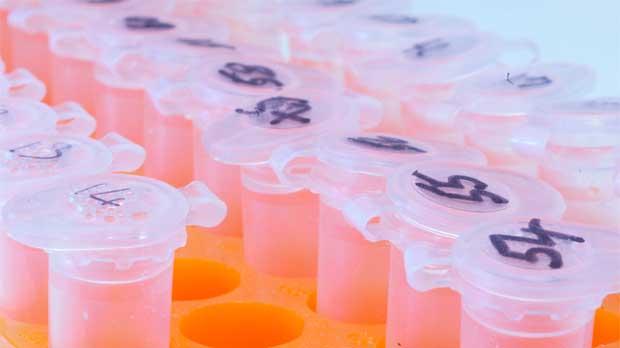
Blood samples
A new link between higher levels of testosterone in the blood and increased risk of melanoma skin cancer in men has been found, according to a study funded by Cancer Research UK. The research conducted by Oxford University scientists was published in the International Journal of Cancer(link is external).
The next step will be to see whether this link is seen in other studies
Dr Eleanor Watts, lead author, said: “This is the first time a link between testosterone and skin cancer has been seen. We already knew men diagnosed with melanoma have a higher risk of developing prostate cancer and vice versa, which was a clue that there may be a common biological or behavioural cause. And it looks like this link might be the hormone, testosterone.“The next step will be to see whether this link is seen in other studies, and if it is, to look more closely at why testosterone might be related to the risk of melanoma developing in men.”
Largest study of its kind to date
The study analysed UK Biobank data on testosterone from around 182,000 men and 122,000 postmenopausal women.The researchers’ findings also supported previously known links between testosterone and prostate cancer in men, and breast and endometrial cancer in postmenopausal women.
But, because it’s hard to calculate how long people spend in the sun, more research will be needed to determine if this new link is biological or if men with higher testosterone spend more time in the sun.
And it will also be crucial to replicate this study using blood samples from people of different ethnicities to see if risk estimates are generalisable as samples from the UK Biobank are predominantly from people of white European ancestry.
But, if there is a direct link, this could be used to identify men who are at a particularly high risk, leading to targeted interventions. And could also inform public health advice and clinical practice.
Enjoying the sun safely
Almost 9 in 10(link is external) (86%) of skin cancer cases in the UK are caused by exposure to sun or use of sunbeds. The risk of developing melanoma is around 3 times higher(link is external) in people who have had sunburn just once every 2 years, compared with people who have never been sunburned. It doesn’t need to peel – sunburn includes reddening of the skin, or skin that feels irritated, tender or itchy.Tips on sun safety and symptoms of melanoma
In the UK, the sun’s UV rays are strongest between 11am and 3pm from mid-March to mid-October.Think about protecting your skin:
1. Spend more time in the shade.
2. Cover up with clothes, a wide-brimmed hat and UV protective sunglasses.
3. And use a sunscreen with at least SPF15 and 4 or 5 stars. Use it generously, reapply regularly and use in combination with shade and clothing.
Symptoms of melanoma skin cancer can include:
• A change in a patch of skin or a nail
• A new growth or sore that won’t heal
• A spot, mole or sore that itches or hurts
• A mole or growth that bleeds, oozes, crusts or scabs
• Any other changes that aren’t normal for you
If something doesn’t look or feel quite right, even if it’s not on this list, talk to your doctor.
Michelle Mitchell, Cancer Research UK’s chief executive, said: “Further research is still needed, but large studies like this could shift our fundamental understanding of skin cancer and help identify people who are at increased risk.
“In the meantime, with lockdown rules starting to lift and the promise of more time outside with friends and family, we should all continue to stay safe in the sun especially if you burn easily. Spending time in the shade, covering up with clothing, and using plenty of sunscreen all help to protect our skin. It’s still very important that anyone who has noticed any unusual change on their skin, gets in touch with their GP. And if it’s tricky getting an appointment, do keep trying.”
cancerresearchuk.org


